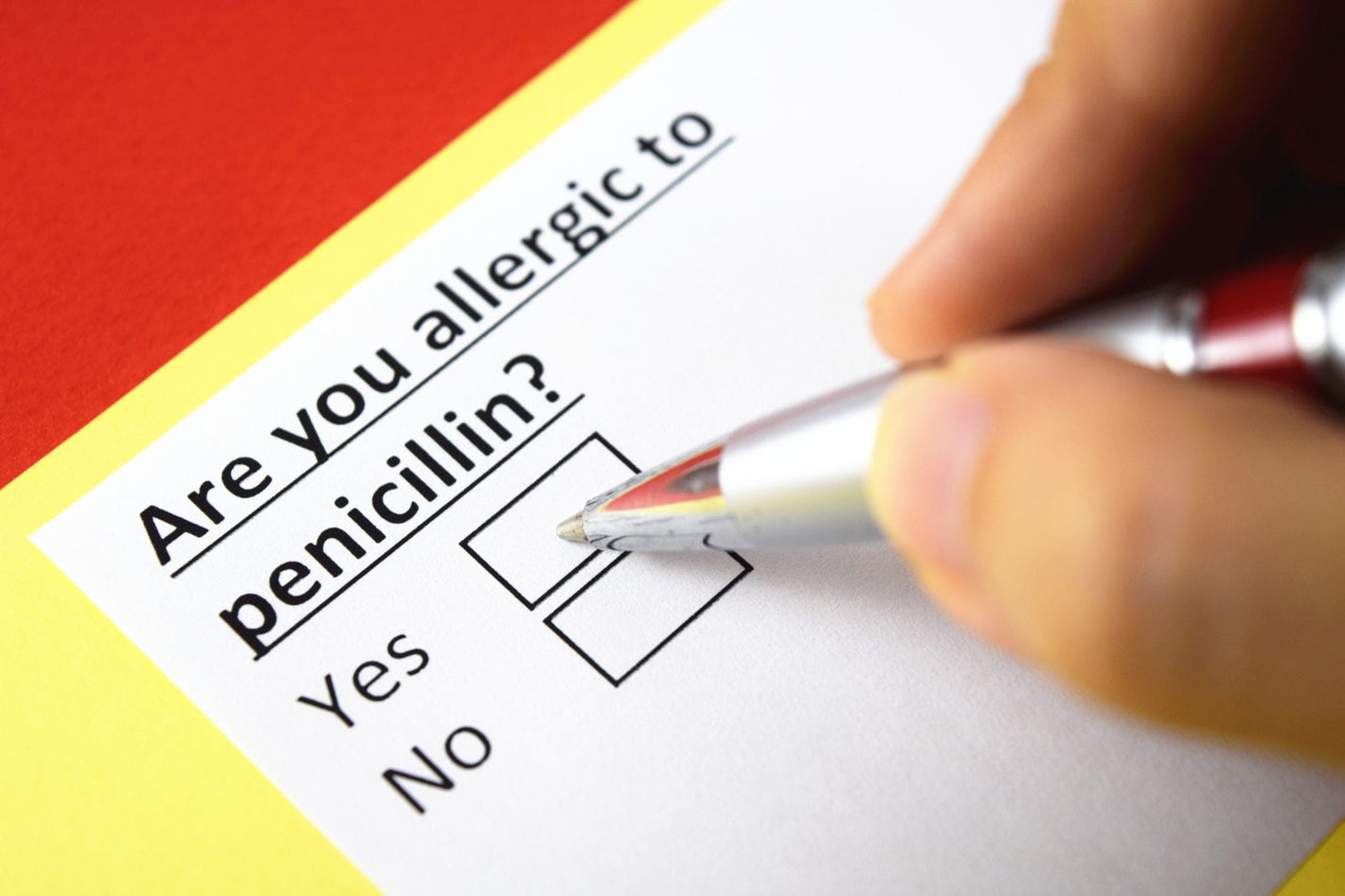Penicillin Allergy: Symptoms, Tests, Treatment and Causes


Penicillin allergy is a type of adverse immune reaction to penicillin, one of the most widely used antibiotics for treating bacterial infections. It affects approximately 10% of the population, making it one of the most frequently reported drug allergies globally. Symptoms can range from mild skin rashes to severe anaphylactic responses, which require urgent medical attention. Since reactions can mimic other allergies, accurate diagnosis is essential to avoid unnecessary avoidance of penicillin and to ensure proper treatment.
In some cases, what appears to be a penicillin allergy may actually be a food or environmental intolerance that mimics drug sensitivity. For a clearer understanding, individuals experiencing recurring unexplained reactions may benefit from intolerance testing to rule out other underlying triggers. Additionally, those with seasonal or environmental sensitivities, such as hay fever, may find their immune system more reactive overall, potentially influencing how their body responds to medications like antibiotics. Understanding the difference between a true allergy and an unrelated intolerance is crucial for guiding treatment decisions and ensuring patient safety. In this article, we’ll explore the symptoms, causes, testing methods, and treatment approaches for penicillin allergy.
Although penicillin allergy is commonly reported, studies suggest that approximately 90% of individuals who believe they are allergic to penicillin can actually tolerate the drug. The overdiagnosis of penicillin allergy leads to the use of alternative antibiotics, which can increase healthcare costs, contribute to antibiotic resistance, and result in less effective treatments. Dr. Elizabeth Phillips, an expert in drug allergy research at Vanderbilt University Medical Centre, emphasises the importance of accurate diagnosis and management of penicillin allergy to improve patient outcomes and reduce healthcare costs .
Accurate diagnosis of penicillin allergy is essential to ensure that patients receive the most effective treatment for their condition while minimising the risk of adverse reactions. Proper diagnosis can also help reduce the unnecessary use of alternative antibiotics, thereby decreasing the risk of antibiotic resistance.
Hives
One of the most common symptoms of penicillin allergy is the appearance of hives – red, itchy, raised welts on the skin. Hives can occur within minutes to hours after taking the medication and can last for several hours or days. For soothing relief, Loratadine, a non-drowsy antihistamine, is often used to reduce itching and calm allergic skin reactions like hives.
Itchy Skin
Itchy skin, or pruritus, is another common symptom of penicillin allergy. This itchiness can be widespread or localised to specific areas of the body and may be accompanied by a rash. Applying a specialised moisturiser such as E45 Itch Relief Cream can help alleviate dryness and reduce irritation, especially when skin is sensitive or inflamed.
Rash
A rash, characterised by red or pink spots on the skin, can develop as a result of penicillin allergy. The rash may be flat or raised and can appear within hours to days after taking the medication. Sudocrem, a well-known barrier cream, may assist in protecting irritated skin and promoting healing in areas affected by rash.
Swelling
Swelling, or angioedema, is another potential symptom of penicillin allergy. This swelling typically occurs around the face, lips, tongue, and throat, and can be uncomfortable or even life-threatening if it obstructs the airway. For milder cases of inflammation, particularly on the skin, a topical steroid like Numark Hydrocortisone Cream 15g may help reduce localised swelling and inflammation when used appropriately.
Anaphylaxis is a severe, life-threatening allergic reaction that can occur rapidly in response to penicillin. Dr. Rebecca Saff, an allergist and immunologist at Massachusetts General Hospital, emphasises the importance of prompt recognition and treatment of anaphylaxis, as it can be fatal if left untreated.
Shortness of breath, or dyspnea, can occur in severe cases of penicillin allergy. This symptom may be accompanied by wheezing or a feeling of tightness in
A penicillin allergy occurs when the immune system mistakenly identifies penicillin as a harmful substance and produces specific antibodies called immunoglobulin E (IgE) to combat it. These IgE antibodies bind to penicillin and trigger an allergic reaction.
When the immune system detects penicillin, it releases chemicals such as histamine into the bloodstream. Histamine is responsible for many of the symptoms associated with an allergic reaction, such as itching, hives, and swelling.
A genetic predisposition to allergies, including penicillin allergy, may be inherited. Research indicates that individuals with a family history of allergies are more likely to develop allergies themselves.
Previous exposure to penicillin, either through medication or environmental sources, can increase the likelihood of developing an allergy. The immune system may become sensitised to penicillin during an initial exposure, causing an allergic reaction upon subsequent exposures.
A thorough medical history and physical examination are essential for diagnosing penicillin allergy. The healthcare provider will ask about the patient's history of allergic reactions, previous exposures to penicillin, and family history of allergies.
A skin prick test is a common method for diagnosing penicillin allergy. During this test, a small amount of penicillin is placed on the skin, and a tiny needle is used to prick the skin's surface. If the patient is allergic, a small, raised bump will appear at the site of the prick within 15 to 20 minutes.
Intradermal testing involves injecting a small amount of penicillin under the skin's surface. If the patient is allergic, a reaction similar to that of the skin prick test will occur. Intradermal testing is more sensitive than skin prick testing but may also yield more false-positive results.
An oral challenge involves administering a small dose of penicillin by mouth under medical supervision. If the patient does not experience an allergic reaction, the dose may be gradually increased. This test is typically performed only if skin testing results are negative or inconclusive.
Blood allergy tests can measure specific IgE antibodies to penicillin in the bloodstream. These tests, such as ImmunoCAP or enzyme-linked immunosorbent assay (ELISA), are less commonly used in diagnosing penicillin allergy due to their lower sensitivity and specificity compared to skin testing. However, they may be considered in certain cases where skin testing is not feasible or appropriate.
The primary management strategy for penicillin allergy is the avoidance of penicillin and other related antibiotics. Patients with a confirmed allergy should inform their healthcare providers and wear a medical alert bracelet to ensure they are not inadvertently exposed to penicillin-containing medications.
In cases where a patient requires antibiotic treatment but has a confirmed penicillin allergy, alternative antibiotics may be prescribed. These alternatives may include cephalosporins, macrolides, or fluoroquinolones, depending on the specific infection being treated and the patient's medical history.
For mild allergic reactions to penicillin, such as itching, hives, or rash, antihistamines can help alleviate symptoms. Antihistamines block the action of histamine, which is responsible for many of the symptoms experienced during an allergic reaction.
Severe allergic reactions, such as anaphylaxis, require immediate treatment with epinephrine. Patients at risk for anaphylaxis should carry an epinephrine auto-injector (e.g., EpiPen) with them at all times and use it as directed in case of a severe reaction. Dr. Rebecca Saff, an allergist and immunologist at Massachusetts General Hospital, stresses the importance of prompt administration of epinephrine in life-threatening situations
Desensitisation is a process in which the patient's immune system is gradually exposed to increasing doses of penicillin, with the aim of reducing or eliminating the allergic response. This procedure should only be performed under close medical supervision and may be considered in situations where penicillin is the most effective treatment option.
Accurate diagnosis of penicillin allergy is crucial to ensure that patients receive the most effective treatment for their condition while minimising the risk of adverse reactions. Proper diagnosis can also help reduce the unnecessary use of alternative antibiotics, thereby decreasing the risk of antibiotic resistance.
Managing penicillin allergy effectively involves a combination of avoidance, appropriate use of alternative antibiotics, and prompt treatment of allergic reactions. By working closely with healthcare providers, patients with penicillin allergy can receive the most appropriate care for their specific needs.
Although living with a penicillin allergy can be challenging, it is possible to lead a healthy and fulfilling life with proper management and care. By understanding the symptoms, causes, and treatment options, individuals with penicillin allergy can make informed decisions about their healthcare and work closely with their healthcare providers to find the most effective treatment strategies.








Plus get the inside scoop on our latest content and updates in our monthly newsletter.